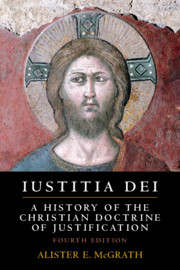Book contents
- Iustitia Dei
- Iustitia Dei
- Copyright page
- Contents
- Tables
- Preface to the Fourth Edition
- Abbreviations
- Introduction
- Part I Justification
- Part II The Middle Ages
- Part III Protestantism
- 11 Is There a ‘Reformation’ Doctrine of Justification?
- 12 Luther’s Early Approach to Justification
- 13 Justification in Lutheranism, 1516–1580
- 14 Reformed Theology, 1519–1560
- 15 The English Reformation
- 16 Protestant Orthodoxy
- 17 Anglicanism
- 18 Puritanism
- 19 Pietism
- Part IV Catholicism
- Part V The Modern Period
- Conclusion
- A Brief Glossary of Medieval Soteriological Terms
- Works Consulted
- Index
14 - Reformed Theology, 1519–1560
from Part III - Protestantism
Published online by Cambridge University Press: 27 January 2020
- Iustitia Dei
- Iustitia Dei
- Copyright page
- Contents
- Tables
- Preface to the Fourth Edition
- Abbreviations
- Introduction
- Part I Justification
- Part II The Middle Ages
- Part III Protestantism
- 11 Is There a ‘Reformation’ Doctrine of Justification?
- 12 Luther’s Early Approach to Justification
- 13 Justification in Lutheranism, 1516–1580
- 14 Reformed Theology, 1519–1560
- 15 The English Reformation
- 16 Protestant Orthodoxy
- 17 Anglicanism
- 18 Puritanism
- 19 Pietism
- Part IV Catholicism
- Part V The Modern Period
- Conclusion
- A Brief Glossary of Medieval Soteriological Terms
- Works Consulted
- Index
Summary
Chapter 14 explores the complex and shifting views on justification that emerged during the Reformed evangelical groups in Zurich, Strasbourg and Geneva over the period 1519 to 1560. Early Reformed theologies of justification, such as that of Zwingli, tended to reflect an Erasmian perspective, seeing justification as one of several ways of framing the transformation of the life of faith through divine grace. However, a growing awareness of the views emerging within the Wittenberg evangelical movement led to more emphasis being placed on the notion of justification, which increasingly came to be understood in a forensic manner. Bucer’s theology of justification can be seen as an important landmark in this process of transition, which is generally considered to have been completed through the theological synthesis achieved by John Calvin in Geneva, particularly in the 1559 edition of his Institutes of the Christian Religion.Calvin’s approach placed an emphasis on the importance of ‘union with Christ’ as a framework for understanding justification as a forensic category, linked with the essentially transformist notion of sanctification.
- Type
- Chapter
- Information
- Iustitia DeiA History of the Christian Doctrine of Justification, pp. 214 - 226Publisher: Cambridge University PressPrint publication year: 2020



